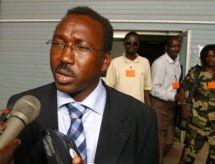African Union talks resume for Sudan’s Darfur region
ABUJA, Sept 4 (AFP) — African Union-sponsored talks between rebels from Sudan’s Darfur region and government officials from Khartoum resumed here Saturday, when they were expected to focus on the key issue of restoring security in the war-torn area.
 The two warring sides met briefly on Saturday morning before adjourning the talks until later in the day.
The two warring sides met briefly on Saturday morning before adjourning the talks until later in the day.
African Union spokesman Assane Ba told AFP that the plenary session had been “postponed to 3:00 pm to allow further consultations.”
The talks for Darfur got off to a difficult start on August 25, with the two rebel groups — the Justice and Equality Movement (JEM) and the Sudan Liberation Movement (SLM) — refusing to demobilise their forces ahead of a comprehensive political settlement.
Before the talks adjourned on Thursday — no dialogue was held Friday to observe the Muslim day of prayer — the rebel groups refused to discuss disarming their forces and demanded an international probe into alleged atrocities by government forces and Khartoum’s proxy militia, the Janjaweed.
The insurgents’ hardline stance came on the first day of talks on the security situation in the war-torn region of western Sudan.
“We are not going to accept the cantonment of our forces, even if it means the collapse of the talks,” said Abdelhafiz Mustapha Musa then, a delegate from the SLM at the Abuja peace conference.
“We will be giving the government the opportunity to bombard our soldiers if we agree to their encampment proposal,” he added.
After days of difficult discussion, the two sides reached agreement Tuesday on how to ensure the safety of Darfur’s 1.2 million internally displaced people.
According to UN estimates, up to 50,000 people have died in Darfur since rebels rose up against the government in February last year, and about 1.4 million people have fled their homes, some 180,000 of them crossing the border into Chad.
The rebels took up arms against Khartoum to protest at the alleged marginalisation of Darfur, a region the size of France, in the west of Africa’s largest country, where oil has been discovered.
The government’s response was to give its proxy militia, the Janjaweed, a free rein in cracking down on the rebels. The Janjaweed has been accused of conducting a scorched earth policy and of ethnic cleansing in Darfur.
Before the talks resumed Saturday, JEM chief negotiator Mohammed Ahmed Tugod told AFP that whether or not the talks make progress “depends entirely on the government and whether it is serious in tackling the problem in Darfur.
“It is important that the Sudanese government takes a serious step to disarm the Janjaweed…,” said Tugod, adding that Khartoum had made a commitment to do so to the international community.
The UN Security Council has ordered that Sudan disarm the Janjaweed, and gave the government a 30-day deadline, which expired Sunday. On Wednesday, UN Secretary General Kofi Annan said attacks were continuing.
Some UN member states want to impose diplomatic or economic sanctions against Sudan, while others want to boost the international presence in Darfur to ensure that the attacks stop.
The African Union has sent 133 unarmed military observers in Darfur and a 300-strong force of Rwandan and Nigerian peacekeepers to protect them as they monitor a ceasefire signed between the government and rebels on April 9.
“These talks are for humanitarian purposes, in order to secure Darfur, in order to enable the people of Darfur to return to their original area,” said Tugod.
“To do that, it is important to discuss the security problem… which depends on the status of the Janjaweed and the status of the Sudanese Army and Air Force.
“We are going to discuss these points because we do believe they are very important and will play an important role in bringing peace and stability which will enable the people to come back to their home villages and community,” he said.
